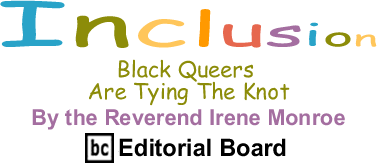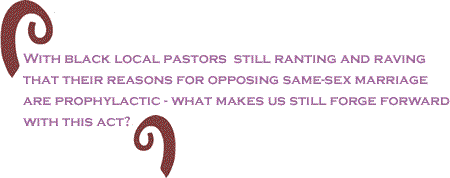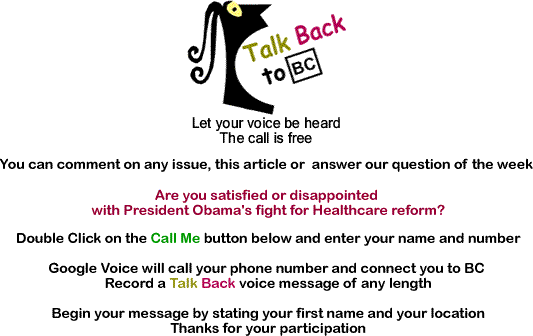
|
||||||||||||||||||||||

|
|
 |
|
| More and more lesbian, gay, bisexual, transgender, and queer people of African descent are marrying. An idea that was once thought of as an anathema to black queer identity, marriage, in our LGBTQ communities, is being celebrated and on the rise. And many of us are now proudly walking down the aisle to tie the knot. "Is it no longer a white thing?" Jeff Nelson, a white gay resident of Cambridge asked me as I was dashing off to perform the nuptials of two lesbians of color -- Gigi DeRosa and Fulani Butler of Roxbury -- on September 20. With black local pastors in Greater Boston and beyond still ranting and raving that their reasons for opposing same-sex marriage are prophylactic to combat the epidemic level of fatherlessness in black communities nationwide, and to stem the demise of the nuclear black family, what makes us still forge forward with this act? And with many of our family members not in attendance at our nuptials, for reasons ranging from shame to religious indoctrination, what message are LGBTQ Americans of African descent hearing now about same-sex marriage that we didnít hear before? The reason for the shift comes both nationally and locally. On the national front, civil rights leaders of the 60ís such as the late Coretta Scott King, Representative John Lewis, NAACP Chair Julian bond, and Reverend Al Sharpton publicly offer their support for same-sex marriage. As a matter-of-fact, John Lewis filed a friend-of-the court brief in the Massachusetts case that led to our state becoming the first in the country to legalize marriage equality. And, during a June 12, 2007 Capitol Hill ceremony commemorating the 40th anniversary of Loving v. Virginia, the landmark U.S. Supreme Court decision that struck down anti-miscegenation laws -- that was sponsored by several straight and queer civil rights organizations across the country -- the Legal Defense & Educational Fund of the NAACP released a historic statement in support of marriage equality explaining why the struggle for same-sex marriage is indeed a civil rights struggle: "It is undeniable that the experience of African Americans differs in many important ways from that of gay men and lesbians; among other things, the legacy of slavery and segregation is profound. But differences in historical experiences should not preclude the application of constitutional provisions to gay men and lesbians who are denied the right to marry the person of their choice."
On the local front, there was a confluence of on-going factors that has had and continues to have a profound impact on how LGBTQ communities of color now think about same-sex marriage. In 2005 when Lee Swislow, Executive Director of Gay & Lesbian Advocates & Defenders (GLAD), a white organization that framed the marriage debate in Massachusetts, reached out to communities of color, inviting a dialogue for an inclusive re-framing of the marriage debate, the collective anger and frustration that LGBTQ communities of color collective felt toward the organization began to dissipate. Also, having an African American governor Deval Patrick, whose daughter is gay, speaking in support of same-sex marriage helped those in our communities of color know that our state and governor are including us in the struggle for marriage equality.
While speaking in support of marriage equality, Patrick told members of the Legislature in 2006 that, "This is likely the greatest civil rights battle of our lifetime. It is fundamentally wrong to discriminate against gay and lesbian citizens. It is as wrong to write discrimination into our historic state constitution. The next and last constitutional convention is rapidly approaching. We must be organized to stop this discriminatory amendment, and prevent it from reaching an uncertain public referendum. I pledge to do what I can to build on that momentum, so that our Constitution will continue to stand for liberty and freedom, and not discrimination." In 2008, Dave Wilson, an African American gay male, and one of the seven same-sex plaintiff couples who won the right to legally marry in the landmark case Goodridge v. the Commonwealth of Massachusetts, became the board president of MassEquality. His appointment was resoundingly applauded throughout black queer communities. And, with the National Black Justice Coalitionís publication "Jumping the Broom: A Black Perspective on Same-Gender Marriage" as an outreach tool to the black community, Wilson was instrumental in having the organization conduct town hall meetings and public forums throughout Greater Boston. While same-sex marriage is still not the most pressing issue in black queer communities here and nationwide, these efforts nonetheless generated discussions among us and in our communities in the context of our families and lives that matters.
BlackCommentator.com
Editorial Board member, the Rev. Irene Monroe, is a religion columnist,
theologian, and public speaker. A native of Brooklyn, Rev. Monroe
is a graduate from Wellesley College and Union Theological Seminary
at Columbia University, and served as a pastor at an African-American
church before coming to Harvard Divinity School for her doctorate
as a Ford Fellow. Reverend Monroe is the author of Let Your Light Shine Like a Rainbow Always: Meditations on Bible
Prayers for Not-So-Everyday Moments |
|
 |
|
Any BlackCommentator.com article may be re-printed so long as it is re-printed in its entirety and full credit given to the author and www.BlackCommentator.com. If the re-print is on the Internet we additionally request a link back to the original piece on our Website. Your comments are always welcome. eMail re-print notice
If you send us an eMail message we may publish all or part of it, unless you tell us it is not for publication. You may also request that we withhold your name. Thank you very much for your readership. |
|
| |
|
| October
1 , 2009 Issue 344 |
|
| Executive Editor: Bill Fletcher, Jr. |
| Managing Editor: Nancy Littlefield |
| Publisher: Peter Gamble |
| Est. April 5, 2002 |
Printer Friendly Version
in resizeable plain
text format or pdf
format. |
 |

|
| |
| |









































